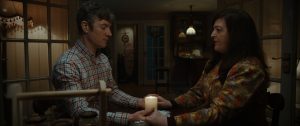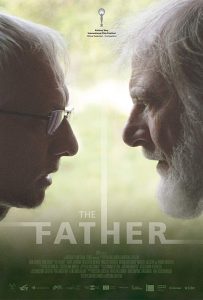















“Bacurau” (“Nighthawk”) (2019 production, 2020 release). Cast: Bárbara Colen, Thomas Aquino, Silvero Pereira, Sônia Braga, Udo Kier, Thardelly Lima, Rubens Santos, Wilson Rabelo, Carlos Francisco, Luciana Souza, Márcio Fecher, Jr. Black, Val Junior, Lia de Itamaracá, Karine Teles, Antonio Saboia, Jamila Fecury, Jonny Mars, Alli Willow, James Turpin, Julia Marie Peterson, Brian Townes, Charles Hodges, Chris Doubek, Buda Lira, Fabiola Líper. Director: Juliano Dornelles and Kleber Mendonça Filho. Screenplay: Kleber Mendonça Filho and Juliano Dornelles. Web site. Trailer.
The impact of bullies has gained wider recognition in recent years. In most instances, this increased attention has focused on the detriment to individuals, but it can just as readily affect groups and entire communities, even if these situations don’t garner the same amount of distinction. But that’s not to suggest that such conditions must be willingly tolerated, a circumstance explored in the enigmatic new morality play, “Bacurau” (“Nighthawk”).
What’s happening in the remote Brazilian village of Bacurau? Not long after the death of the town’s 94-year-old matriarch, Carmelita (Lia de Itamaracá), all manner of strangeness has occurred. Admittedly, things weren’t entirely “normal” before her passing, but, in the time since her transition, the weirdness has been significantly ramped up. Consider the following:
[caption id="attachment_11431" align="aligncenter" width="350"] The death of the matriarch of a remote Brazilian village is followed by a series of unusual events, a concern for the locals, in the intriguing new offering, “Bacurau” (“Nighthawk”), available for first-run online streaming. Photo by Victor Jucá, courtesy of Kino Lorber.[/caption]
The death of the matriarch of a remote Brazilian village is followed by a series of unusual events, a concern for the locals, in the intriguing new offering, “Bacurau” (“Nighthawk”), available for first-run online streaming. Photo by Victor Jucá, courtesy of Kino Lorber.[/caption]
 Teresa (Bárbara Colen, center), granddaughter of the deceased matriarch of a remote Brazilian community, returns home for her relative’s funeral in the latest release from the writing/directing duo of Juliano Dornelles and Kleber Mendonça Filho, “Bacurau” (“Nighthawk”). Photo courtesy of Kino Lorber.[/caption]
Teresa (Bárbara Colen, center), granddaughter of the deceased matriarch of a remote Brazilian community, returns home for her relative’s funeral in the latest release from the writing/directing duo of Juliano Dornelles and Kleber Mendonça Filho, “Bacurau” (“Nighthawk”). Photo courtesy of Kino Lorber.[/caption] Mysterious stranger Michael (Udo Kier, left) has a tense encounter with village physician Dr. Domingas (Sônia Braga, right, back to camera) in the new Western-style thriller, “Bacurau” (“Nighthawk”). Photo courtesy of Kino Lorber.[/caption]
Mysterious stranger Michael (Udo Kier, left) has a tense encounter with village physician Dr. Domingas (Sônia Braga, right, back to camera) in the new Western-style thriller, “Bacurau” (“Nighthawk”). Photo courtesy of Kino Lorber.[/caption] Michael (Udo Kier), leader of a mysterious band of foreigners, has an agenda for a remote Brazilian village, but what is it? That’s the secret of 2019 Cannes Film Festival Jury Prize winner “Bacurau” (“Nighthawk”), now available for first-run online streaming. Photo courtesy of Kino Lorber.[/caption]
Michael (Udo Kier), leader of a mysterious band of foreigners, has an agenda for a remote Brazilian village, but what is it? That’s the secret of 2019 Cannes Film Festival Jury Prize winner “Bacurau” (“Nighthawk”), now available for first-run online streaming. Photo courtesy of Kino Lorber.[/caption]
 “Se for, vá na paz” – “If you go, go in peace” – the motto of Bacurau, a remote Brazilian village, gets put to the test in the enigmatic new thriller, “Bacurau” (“Nighthawk”), now available for first-run online streaming. Photo courtesy of Kino Lorber.[/caption]
“Se for, vá na paz” – “If you go, go in peace” – the motto of Bacurau, a remote Brazilian village, gets put to the test in the enigmatic new thriller, “Bacurau” (“Nighthawk”), now available for first-run online streaming. Photo courtesy of Kino Lorber.[/caption]“Sorry We Missed You” (2019 production, 2020 release). Cast: Kris Hitchen, Debbie Honeywood, Rhys Stone, Katie Proctor, Ross Brewster, Charlie Richmond, Julian Ions, Sheila Dunkerley, Maxie Peters, Christopher John Slater, Heather Wood, Alberto Dumba, Natalia Stonebanks, Jordan Collard. Director: Ken Loach. Screenplay: Paul Laverty. Web site. Trailer.
Have you ever been so dissatisfied with your circumstances that you were willing to take drastic steps to change them? And, if so, have you ever subsequently found yourself no more fulfilled afterward, despite high hopes going in? What next? Do you formulate yet another new plan, or do you reconcile yourself to the futility of trying and give up on starting over? That’s a tough call, especially for the discouraged, but it’s the reality for a blue collar family seeking a better life in the affecting new drama, “Sorry We Missed You.”
It’s a safe bet that most of those in the working class want to be able to get ahead. So it is with the Turner Family of Newcastle, England. Breadwinners Ricky (Kris Hitchen) and Abby (Debbie Honeywood) put in long hours to provide for their children, Seb (Rhys Stone) and Liza Jae (Katie Proctor). They’ve been trying to save up to buy a home, an opportunity they once nearly realized but that slipped away when the housing bubble burst, forcing them to rent ever since. But, despite the so-called resurgence of the economy, saving enough money for a down payment has been challenging, so much so that, even with two incomes, the dream always seems out of reach.
After years of working in various construction and laborer trades, Ricky has decided to try a new approach – becoming an independent contractor for a package delivery company. Maloney (Ross Brewster), the smooth-talking but hard-nosed manager of the depot out of which he’ll work, paints a rosy picture of the opportunity, deftly qualifying it with an array of euphemistic caveats, most of which carry monetary penalties for failure to comply with expectations. But, with the potential for glittering rewards dangled before him, Ricky decides to sign on.
[caption id="attachment_11423" align="aligncenter" width="350"] The Turner Family (from left), Abby (Debbie Honeywood), Liza Jae (Katie Proctor), Seb (Rhys Stone) and Ricky (Kris Hitchen), seek a better life in a challenging economy, as depicted in the new English drama, “Sorry We Missed You.” Photo by Joss Barratt, courtesy of Zeitgeist Films.[/caption]
The Turner Family (from left), Abby (Debbie Honeywood), Liza Jae (Katie Proctor), Seb (Rhys Stone) and Ricky (Kris Hitchen), seek a better life in a challenging economy, as depicted in the new English drama, “Sorry We Missed You.” Photo by Joss Barratt, courtesy of Zeitgeist Films.[/caption]
From the outset, however, the promise of this arrangement gets thrown into question. For instance, Ricky is given the choice of renting his delivery vehicle or buying one outright. The high purchase price is daunting, even though it would appear to be more economical in the long run than paying on a hefty ongoing lease. But, to make the acquisition, Ricky would need to shell out a significant down payment, one that can only be accommodated by selling Abby’s car, a move that would subsequently require her to use public transportation to get around on her job as a visiting home caretaker for the elderly and disabled, a prospect that upsets her. However, with a basket of optimism behind him, Ricky goes ahead and makes the purchase in hopes that it will get him off to a flying start with this new opportunity.
Before long, though, reality sets in, and Ricky begins to see that the grass isn’t as green as he imagined. Troubles with tight delivery schedules, irascible package recipients, long hours, endless company rules and regulations, and ever-accruing fines for the smallest of infractions take their toll, leaving Ricky perpetually exhausted and burdened by the feeling he needs to keep working despite the hardships. Meanwhile, Abby’s job becomes more onerous as well, given that her commuting time between client visits is longer and out of her control, not to mention the fact that the responsibilities and requirements of her work seem to grow increasingly more demanding.
With Ricky and Abby working so much, life at home becomes more difficult as well. Seb, an artistically gifted but rebellious teen with something of a history of acting out, grows more unruly, skipping school, defying his parents and partaking in petty crime. Liza Jae, meanwhile, a remarkably self-sufficient pre-teen, seeks to hold the family together, helping out Ricky with his delivery route and trying to reason with her older brother. But, no matter how much Ricky, Abby and Liza Jae pull together to maintain the household, matters grow progressively more trying, especially as Seb seeks to assert his independence – and becomes embroiled in ever more trouble.
[caption id="attachment_11424" align="aligncenter" width="350"] Breadwinner Ricky Turner (Kris Hitchen) starts a new job as an independent contractor for a package delivery service in director Ken Loach’s acclaimed new drama, “Sorry We Missed You.” Photo by Joss Barratt, courtesy of Zeitgeist Films.[/caption]
Breadwinner Ricky Turner (Kris Hitchen) starts a new job as an independent contractor for a package delivery service in director Ken Loach’s acclaimed new drama, “Sorry We Missed You.” Photo by Joss Barratt, courtesy of Zeitgeist Films.[/caption]
As the Turners’ story unfolds, the situation worsens, so much so that the family’s very survival is threatened. The circumstances raise the question, “Is this living?” Indeed, if this is what it takes to get ahead, one can’t help but wonder whether it’s all worth it, especially since it seems as though the deck is stacked against them in a scrupulously rigged system. Of course, it also makes one wonder how long working class folks are willing to put up with conditions like this. That’s what the Turner Family is up against. How will they respond?
Keeping up with everything that’s going on in today’s fast-paced world is challenging. That can become even more problematic when we’re confronted with a barrage of ever-growing demands, particularly when it comes to trying to strike a balance between our home and work lives. Just ask any parents who dutifully toil away – sometimes in multiple jobs – to make ends meet while caring for their families. Such situations can truly test our mettle. But how much are we willing to put up with?
Circumstances like these often prove to be important life lessons, especially when it comes to managing our personal power. How we fare at that generally has much to do with our beliefs, the building blocks of the conscious creation process, the philosophy that maintains we draw upon these resources in manifesting the existence we experience. So this naturally raises the question, “How are we doing?” It also prompts us to examine what beliefs we have in place to support our positions. Are they adequate for our needs? Are we comfortable wielding the personal power we possess? Or are we coming up short?
Many of us are unaware of just how much personal power we have – or could have. In either case, it all depends on the beliefs we put in place. If we allow ourselves to buy into the notion that we are powerful beyond measure, as author Marianne Williamson put it, there’s no telling what we might accomplish. But, if we see our lives as a struggle, then we’ll constantly experience it as such – until we intentionally decide to contend otherwise.
[caption id="attachment_11425" align="aligncenter" width="350"] Visiting home caretaker Abby Turner (Debbie Honeywood, left) attends to one of her clients, Rosie (Sheila Dunkerley, right), in the unflinchingly honest new working class drama, “Sorry We Missed You.” Photo by Joss Barratt, courtesy of Zeitgeist Films.[/caption]
Visiting home caretaker Abby Turner (Debbie Honeywood, left) attends to one of her clients, Rosie (Sheila Dunkerley, right), in the unflinchingly honest new working class drama, “Sorry We Missed You.” Photo by Joss Barratt, courtesy of Zeitgeist Films.[/caption]
The Turners’ experience provides a perfect example of this. For years, Ricky and Abby have lived with the clouds of stress and strain perpetually hanging over them, undercutting their dreams and forcing them to keep plugging away for unsatisfying and underwhelming gains. When Ricky decides to become an independent contractor, he takes a step toward asserting his independence and following his desire to do better for himself and his family. But is he fully convinced that his new plan will accomplish that? If he’s unwittingly holding onto beliefs from his old way of thinking, his attempt at establishing a new life won’t bear fruit; the contradiction in his beliefs will undercut his efforts at successfully striking out in a new direction. This is not to suggest that his new undertaking is all for naught; he simply needs to further refine his beliefs to bring about the desired outcome. This will almost assuredly take some honest scrutiny to find the fly in the metaphysical ointment, but, should he succeed at this, he has a bona fide opportunity to pursue his family’s dream of a better life – and even to achieve it.
A key element in this is being able to push aside the belief camouflage that’s obscuring a clear view of the true intentions that are in place. In many cases, we may think we have an accurate perspective on what we’re trying to manifest, but, upon further review, we may well find that undetected ancillary considerations are blocking our view. Oftentimes this involves identifying long-established beliefs that probably took root in our past; they become grounded in our consciousness and hold on relentlessly, even if not obviously, thereby enabling the perpetuation of our creations – and illustrating the power and persistence of our beliefs.
In Ricky’s case, there’s a good chance that those struggle-based beliefs have held on, cleverly concealed and preventing his new intentions from coming into full flower. This becomes evident through the many trials and tribulations that he experiences, both on the job and in his home life, which usually serve to make his work life that much more challenging. It creates a maddening cycle from which escape seems virtually impossible. That’s certainly not set in stone, but, if he genuinely wants out, he must make a concerted effort to change his circumstances by changing his beliefs.
[caption id="attachment_11426" align="aligncenter" width="350"] Delivery man Ricky Turner (Kris Hitchen, left) receives assistance from his young daughter, Liza Jae (Katie Proctor, right), on his route, one of the rare times they get to see each other, in director Ken Loach’s “Sorry We Missed You.” Photo by Joss Barratt, courtesy of Zeitgeist Films.[/caption]
Delivery man Ricky Turner (Kris Hitchen, left) receives assistance from his young daughter, Liza Jae (Katie Proctor, right), on his route, one of the rare times they get to see each other, in director Ken Loach’s “Sorry We Missed You.” Photo by Joss Barratt, courtesy of Zeitgeist Films.[/caption]
In situations like this, a tool that can be especially helpful is developing our sense of discernment, the ability to critically size up the prevailing conditions to see where the problems lie and where the opportunities for improvement exist. Taking time to deliberately scrutinize the circumstances goes a long way toward accomplishing this, especially when it comes to employing the power of our intuition. As conscious creators are well aware, intuition plays a pivotal role in belief formation, and it’s a tool that’s often underused or dismissed as being unreliable. However, should we purposely employ it more often, taking it seriously despite its seeming “irrationality,” we may find that the faith and trust we place in it pays big dividends.
Learning to trust our intuition is part of an even bigger component of this puzzle – our willingness to move past our fears and live heroically. Charting the waters of the unknown can be daunting, to be sure, yet the opportunities that can best foster our personal growth and development often lie in that unexplored territory. To their credit, Ricky and Abby both seem willing to take a stab at this, even if their steps are somewhat tentative at times. But the example they set provides the timid among us with courageous guidance on how we might consider proceeding, especially if we’re dissatisfied with our circumstances.
All of the foregoing is important given recent events. The global pandemic and the attendant panic that has accompanied it have certainly shaken us to our core, prompting rampant uncertainty about the future. However, as many in the metaphysical community have observed, considering the profound impact these conditions have had and continue to have, we’ve also been presented with an opportunity for groundbreaking change. Since it’s become apparent that we have embarked upon a new normal in which the world we’re entering will be significantly different from what we’re accustomed to, we now have a chance, both individually and collectively, to launch into a new future for ourselves. We have a window open to us to wipe away what no longer serves us. Great changes have already become readily apparent in such areas as crime rates and the environment, emerging with remarkable speed, scope and consistency. So, if change can be effected in ventures as sweeping as these, imagine what else might be possible, particularly in endeavors that hit closer to home. When couched in those terms, Ricky and Abby just might be able to get that house of theirs after all.
[caption id="attachment_11427" align="aligncenter" width="350"] At a rare family dinner, the Turner Family (clockwise from left), Ricky (Kris Hitchen), Abby (Debbie Honeywood), Seb (Rhys Stone) and Liza Jae (Katie Proctor, back to camera), get to see one another for a change in the new English drama, “Sorry We Missed You.” Photo by Joss Barratt, courtesy of Zeitgeist Films.[/caption]
At a rare family dinner, the Turner Family (clockwise from left), Ricky (Kris Hitchen), Abby (Debbie Honeywood), Seb (Rhys Stone) and Liza Jae (Katie Proctor, back to camera), get to see one another for a change in the new English drama, “Sorry We Missed You.” Photo by Joss Barratt, courtesy of Zeitgeist Films.[/caption]
Director Ken Loach’s searingly honest saga about the lengths a working class family must go to in order to make ends meet serves up a damning indictment of a business world lacking in compassion, sensitivity and flexibility. In many ways, this release recalls the filmmaker’s previous offering, “I, Daniel Blake” (2016), a clarion call for greater empathy for those who have needs that must be addressed, especially by sources eminently capable of providing it. The film’s poignancy is particularly relevant under today’s prevailing conditions, especially in matters of making a living and having hope for the future. The picture’s superb ensemble cast and incisive script work together seamlessly to tell a tale of frustration, thwarted dreams and grim truths about a rigged system that keeps even the most industrious laborers from being able to get ahead, no matter how honestly and productively they toil. “Sorry We Missed You” can be an infuriating movie to watch at times, but its honesty and authenticity are undeniable – the kind of story that inspires us all to demand change.
Loach’s latest effort has not gone unnoticed. In the recently completed movie awards season, the picture earned a BAFTA Award nomination for Best British Film, as well as a Palme d’Or nod at the 2019 Cannes Film Festival, the event’s highest honor. The film has screened widely overseas and has played at numerous film festivals. In North America, with the current closure of movie theaters, the picture has been made available for first-run online streaming.
When life’s lemons are so plentiful that it would take a tanker truck to hold all of the lemonade they’d make, it would be easy to give up out of sheer frustration. That’s understandable, but, in the long run, what would that solve? The problems that sparked such a defeatist response would still linger, perhaps getting worse. Instead, rewriting the game plan at least offers the potential for turning things around for the better. Such a venture would likely require some thoughtfulness, creativity, and even a little good, old-fashioned elbow grease, all with the aim of realizing a new hope – and a new future.
Copyright © 2020, by Brent Marchant. All rights reserved.
What in the world is going on these days? That's a good question, one we're opening up for discussion on a special edition of Frankiesense & More on The Good Media Network. Tune in on Facebook Live on Friday April 10 at 12 pm ET for a thoughtful discussion of a wide range of topics with host Frankie Picasso, yours truly and special guest author Sandra Beck by clicking here.

“Extra Ordinary” (2019 production, 2020 release). Cast: Maeve Higgins, Barry Ward, Will Forte, Claudia O’Doherty, Jamie Beamish, Terri Chandler, Risteard Cooper, Emma Coleman, Mary McEvoy, Jon Cheung, Jed Murray, Aggie Ellis. Directors: Mike Ahern and Enda Loughman. Screenplay: Mike Ahern, Demian Fox, Maeve Higgins and Ena Loughman. Web site. Trailer.
At times, it feels like the world around us is shrinking (especially these days). But, if anything, it would be to our benefit in many ways to explore and embrace a broader view, one that expands our horizons and helps us to consider a broader range of possibilities. After all, we might never know what could come from such an effort unless we try, including in areas of our lives that seem fundamentally removed from what we initially set out to do. Such is the case for a cast of colorful characters in the new Irish paranormal comedy, “Extra Ordinary.”
Driving instructor Rose Dooley (Maeve Higgins) leads a generally stable, albeit somewhat unremarkable, life in a small town in rural Ireland. The jovial, playfully quirky middle-aged wallflower dutifully goes about her work and occasionally spends time with her pregnant sister, Sailor (Terri Chandler), though much of the time she’s on her own. The idea of possibly dating someone intrigues her, but, when she considers the effort involved, she’d just as soon skip it and stay at home, lounging in her underwear and downing a carton of yogurt. All in all, it’s a pretty mundane life.
However, there is one aspect that distinguishes Rose’s life – or could distinguish it – if only she’d allow it: Rose is a gifted psychic well versed in the occult arts. It’s a skill that she developed while a child (Aggie Ellis) working as a collaborator with her father, Vincent (Risteard Cooper), a paranormal researcher who produced a series of videos about supernatural subjects. Vincent was particularly interested in ghosts, whom he claimed could be found everywhere and were capable of taking myriad forms, from individuals to animals to inanimate objects, and Rose skillfully aided him in his various undertakings. But, despite the expertise she amassed through these experiences, Rose turned her back on this work after a spiritual encounter gone wrong in which her father was killed in a freak accident involving a “possessed pothole,” an incident for which she believed she was responsible. She walked away, and never looked back.
Nevertheless, despite Rose’s reluctance to embrace new paranormal investigations, she still gets calls from locals seeking assistance with various supernatural issues – unexplained events, pesky spirits, an ornery trash can and all manner of other mysterious phenomena. And, even though the callers insist they need help, Rose always turns them down, choosing instead to focus on her driving school business. But, try as she might to avoid these requests, given her abilities and reputation, she can’t escape them.
While going about her regular routine one day, Rose receives a call from a potential new student, Martin Martin (Barry Ward), a single father raising a teenage daughter, Sarah (Emma Coleman). Rose willingly agrees to take on Martin as a client, especially since she has a passing familiarity with the handsome – and available – widower, a potential romantic prospect who brings a definite sparkle to her eye. As it turns out, though, the request for driving lessons is just a ruse; Martin’s actually interested in Rose’s psychic abilities to help him save Sarah from what appears to be some kind of paranormal takeover. And, when Rose sees the teen levitating above her bed, she’s convinced she has to get involved.
[caption id="attachment_11409" align="aligncenter" width="350"] Psychic driving instructor Rose Dooley (Maeve Higgins, right) works with single father Martin Martin (Barry Ward, left) in working out several paranormal dilemmas in the wacky new Irish comedy, “Extra Ordinary.” Photo courtesy of Kino Lorber.[/caption]
Psychic driving instructor Rose Dooley (Maeve Higgins, right) works with single father Martin Martin (Barry Ward, left) in working out several paranormal dilemmas in the wacky new Irish comedy, “Extra Ordinary.” Photo courtesy of Kino Lorber.[/caption]
In her work with Martin, Rose further discovers that he’s being routinely harassed by the spirit of his deceased wife, Bonnie. Martin, as it turns out, is quite the henpecked husband, regularly pestered by his late spouse over everything from his choice of clothes to what he can (and can’t) eat. Rose’s presence isn’t welcome, either, as she discovers firsthand when Bonnie begins inflicting her fury on her.
However, Bonnie’s wrath isn’t enough to deter Rose from finding a solution to Sarah’s dilemma. Despite Bonnie’s outbursts, Rose doubts that she is responsible for the situation, given that it involves her own daughter. So that begs the question, “Who’s behind it?”
Unbeknownst to Rose and Martin, the possession is being orchestrated by Christian Winter (Will Forte), a has-been, one-hit wonder pop star seeking to revive his sagging career by making a deal with the devil, a satanic transaction that calls for a virgin sacrifice. Believing that Sarah meets his demonic cohort’s needs, Christian performs incantations and other rituals to summon the teen to his estate on the night of a blood moon. Of course, to pull that off successfully, he must overcome the incessant interference of his demanding, whiny, needy wife, Claudia (Claudia O’Doherty), not to mention the heroic efforts of Rose and Martin to rescue the daughter in distress.
[caption id="attachment_11410" align="aligncenter" width="350"] Teenager Sarah Martin (Emma Coleman) is the object of incantations and rituals for a satanic virgin sacrifice in the new Irish paranormal comedy, “Extra Ordinary.” Photo courtesy of Kino Lorber.[/caption]
Teenager Sarah Martin (Emma Coleman) is the object of incantations and rituals for a satanic virgin sacrifice in the new Irish paranormal comedy, “Extra Ordinary.” Photo courtesy of Kino Lorber.[/caption]
There’s a lot riding on what happens when everything comes together for an eventful climax. Will Rose and Martin free Sarah from Christian’s nefarious clutches? Will Christian be able to revive his pathetic music career? Will Claudia ever stop complaining? And can Rose liberate Martin from Bonnie’s constant hounding? Tune in for a spirited conclusion.
Paranormal topics often evoke a variety of responses. Some look upon them as utter nonsense, seeing them as imaginary, fanciful or ludicrous notions. Others dread them, their scary nature conjuring up all sorts of horrific images. And others still believe in them whole-heartedly, viewing them as just another expression of the grand scheme of existence. There may even be cases where these outlooks overlap, as evidenced by Rose’s hesitancy to deal with them despite her proficiency in addressing them. Whatever view an individual embraces, however, depends on one’s beliefs, for they serve to manifest what materializes, a product of the conscious creation process, the philosophy that maintains we draw upon these intangible resources in shaping our reality. And what a reality the protagonists have created here!
Despite the strange happenings, however, there are reasons behind what occurs as a result of these bizarre events, including some valuable life lessons. Most obviously, the incidents that unfold here show us that there’s indeed more to existence than what’s before our eyes. At bottom, this is intended to get us to expand our horizons, to move beyond limitations constrained by conventional thinking and to encourage us to envision – and recognize – the wider world that’s around us. When the film shows us, for example, that ghosts can adopt all manner of forms – from tree branches to appliance cords to family pets – it provides characters and viewers alike with insights that transcend traditional perspectives, perhaps winning over skeptics and broadening the scope of paranormal agnostics.
[caption id="attachment_11411" align="aligncenter" width="350"] One-hit wonder pop star Christian Winter (Will Forte, right), with the assistance of his wife, Claudia (Claudia O’Doherty, left), seeks to revive his sagging career with a satanic transaction in “Extra Ordinary.” Photo courtesy of Kino Lorber.[/caption]
One-hit wonder pop star Christian Winter (Will Forte, right), with the assistance of his wife, Claudia (Claudia O’Doherty, left), seeks to revive his sagging career with a satanic transaction in “Extra Ordinary.” Photo courtesy of Kino Lorber.[/caption]
One set of limitations that’s particularly important to overcome involves the fears that hold us back, something that frequently comes up in scenarios involving the supernatural. This can be crucial for those who feel like they’re being unduly held back, preventing them from growing and developing as individuals. This can occur even with those for whom it would seem such fears shouldn’t be an issue. Rose, for instance, is well acquainted with ghosts, apparitions and spirits, yet, based on what happened with her father, she has a definite apprehension about becoming reacquainted with the subject matter. But, given the various issues she’s seeking to address, if she’s to succeed, she’ll need to move past the beliefs that are restricting her, not only in her vocational life, but also in her romantic endeavors. That may be a lot for her to take on, and the circumstances that she draws to her to deal with these matters could be a lot to handle, but, should she conquer these qualms, she could see remarkable outcomes from her efforts.
When it comes to the incident involving her father, Rose has been carrying a heavy burden for quite some time. The belief has become entrenched, and, as her story reveals, it has been significantly holding her back. She feels saddled with guilt, and she has not been allowing herself to use the gifts that seem to come so naturally to her. But there’s no need to stay stuck; rewriting one’s beliefs is always possible, and that can be particularly beneficial in matters of redemption. There’s no reason for Rose to believe that she must remain trapped in the personal purgatory she’s created for herself unless she intentionally chooses to do so. Of course, she’ll need to recognize this before she can do anything about it, but, if circumstances enable that, there’s no telling what she can accomplish – and what encumbrances she can offload, especially those that are serving no useful purpose.
By making changes such as this, we have an opportunity to live out our destiny, to practice what conscious creators call value fulfillment, the concept associated with being our best, truest selves for the benefit of ourselves and those around us. Should Rose opt to pursue this course, she can do a world of good both for herself and those in her community. With so many mischievous spirits about (such as Bonnie), Rose has the power to help improve the lives of the victims subjected to their abuse. It makes it possible to help realize ideas that otherwise might not have been given a ghost of a chance.
[caption id="attachment_11412" align="aligncenter" width="350"] According to a paranormal researcher, ghosts are seemingly everywhere, even in the most ordinary circumstances, as seen in the raucously funny new comedy, “Extra Ordinary.” Photo courtesy of Kino Lorber.[/caption]
According to a paranormal researcher, ghosts are seemingly everywhere, even in the most ordinary circumstances, as seen in the raucously funny new comedy, “Extra Ordinary.” Photo courtesy of Kino Lorber.[/caption]
This little-known Irish gem from directors Mike Ahern and Enda Loughman links the wildly outrageous with the raucously funny and warmly touching in an off-the-wall paranormal comedy. While the film drags a bit in the first half hour and occasionally tries a little too hard to land its laughs, it nevertheless progressively hits a series of home runs with its one-liners and visual gaffes, especially in its raucous last half hour. Comedienne Higgins plays well off her two male co-stars, seamlessly weaving together both jokes and straight lines, always keeping viewers guessing what she’ll say. With clever comic nods to horror classics like “The Exorcist” (1973) and “Ghost Busters” (1984), this independent offering, now available for first run streaming, definitely passes the time nicely. It’s not everybody’s cup of tea, but, for those who like their humor a bit on the twisted side, this is one for you.
When things don’t go the way we hope they would, it’s easy to start shutting down and closing ourselves off. But, by doing so, we run the risk of missing out on a wealth of rewarding experiences, in a wide spectrum of life. By being willing to cast off our self-imposed shackles and explore opportunities we might not otherwise have considered, we can see a big, wide world we may have never known existed. And that, truth be told, is truly something extraordinary.
Copyright © 2020, by Brent Marchant. All rights reserved.
Tune in for the latest Cinema Scribe segment on Bring Me 2 Life Radio, today, April 7, at 2 pm ET. And, if you don't hear it live, catch it later on demand!






